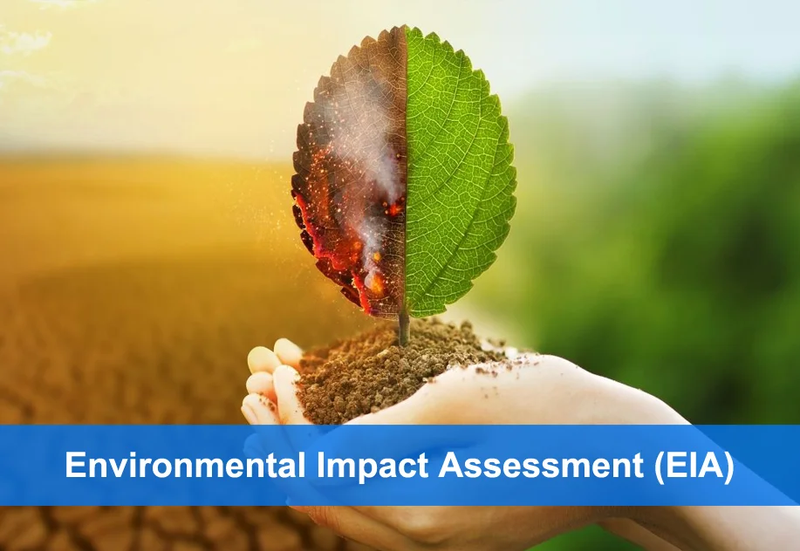Environmental Impact Assessment (EIA)

We help organizations, developers, and project owners assess, mitigate, and manage the potential environmental impacts of their proposed projects or activities. Whether you’re planning a new development, industrial facility, infrastructure project, or any activity that could affect the environment, our team provides a robust and systematic approach to evaluate environmental risks and ensure compliance with local, national, and international standards.
An effective EIA helps you make informed decisions, reduce environmental risks, and enhance sustainability, all while ensuring that your projects meet regulatory and public expectations.
🧭 Our EIA Process
Our EIA service follows a thorough and transparent process, in accordance with national legislation (such as the Nigerian EIA Act) and international standards (e.g., ISO 14001, World Bank, IFC guidelines). We focus on sustainable development by ensuring environmental protection without compromising the project’s success.
1. Project Scoping and Initial Consultation
Stakeholder Engagement: We begin by understanding your project’s scope, objectives, and timeline. We also engage relevant stakeholders, including local communities, government authorities, and other parties affected by the project.
Scoping Study: We identify key environmental aspects, potential impacts, and concerns to define the boundaries of the assessment.
EIA Terms of Reference (TOR): A comprehensive document is drafted outlining the methodology, approach, and specific areas to focus on in the assessment.
2. Baseline Environmental Data Collection
Site Survey & Data Gathering: We conduct site visits and data collection activities to assess the current environmental conditions. This includes land, air, water, biodiversity, socio-economic, and health factors.
Stakeholder Meetings: We hold public consultations and meetings with key stakeholders to understand local concerns and gather data on community and social impacts.
Baseline Studies: The data is analyzed to establish the baseline environmental conditions, which will serve as a reference for comparing potential impacts.
3. Impact Identification and Evaluation
Impact Prediction: Using scientific tools, models, and professional judgment, we predict the potential environmental impacts of your project on air, water, soil, noise, biodiversity, and human health.
Risk Assessment: We evaluate the severity, probability, and significance of each identified impact, considering both short-term and long-term effects.
Impact Mitigation: We propose mitigation measures for each identified negative impact. This can include design changes, pollution control, waste management practices, and other interventions to minimize harm.
4. Alternatives Assessment
Project Alternatives: We assess alternatives to the proposed project design, including alternative sites, technologies, and methodologies. This helps in selecting the environmentally preferable option.
Best Practices: We recommend global best practices and sustainable technologies that minimize environmental harm while achieving project objectives.
5. Environmental Management and Mitigation Plans
Environmental Management Plan (EMP): We prepare a comprehensive EMP detailing the mitigation measures, responsible parties, timelines, monitoring protocols, and contingency plans.
Monitoring Plans: We design an effective monitoring framework to track environmental performance throughout the project lifecycle, from construction to operation.
6. Public Participation and Reporting
Stakeholder Consultations: Public consultations are held with stakeholders, especially local communities, to ensure that their concerns are taken into account and addressed in the EIA report.
Environmental Impact Assessment Report: We prepare a comprehensive and transparent EIA Report, summarizing all findings, impacts, mitigation measures, and stakeholder input.
Public Disclosure: The EIA Report is submitted to relevant regulatory authorities for approval and made available for public review.
7. Regulatory Approval and Compliance
Government Submission: We submit the final EIA report to relevant authorities, such as the National Environmental Standards and Regulations Enforcement Agency (NESREA) or state-specific environmental agencies.
Follow-up: We support you through the approval process and ensure compliance with all legal and regulatory requirements.
🏛️ Why Choose Our EIA Service?
1. Expertise & Experience
Our team consists of highly qualified environmental professionals, including environmental scientists, engineers, and regulatory experts. We bring years of experience in conducting EIAs for various sectors, including construction, manufacturing, oil & gas, energy, infrastructure, mining, and agriculture.
2. Tailored Solutions
Every project is unique, and so is our approach. We work closely with you to tailor the EIA process according to your project’s specific needs, location, and regulatory environment.
3. Regulatory Compliance
We ensure that your project complies with local and national laws (e.g., Nigeria’s Environmental Impact Assessment Act) and international environmental standards. Our EIA process is designed to meet the requirements of the World Bank, IFC, and ISO 14001 for environmental management systems.
4. Sustainability Focus
We not only focus on compliance but also on sustainability. Our solutions help minimize the environmental footprint of your projects while improving their long-term viability and positive impact on local communities.
5. Stakeholder Engagement
Effective stakeholder engagement is central to our EIA process. We ensure that local communities, government agencies, and other stakeholders have a voice in the process and that their concerns are addressed.
📈 Industries We Serve
Our EIA services are applicable to a wide range of industries, including but not limited to:
Construction & Real Estate: Urban development, housing projects, roads, bridges, and infrastructure.
Energy & Power: Renewable energy, oil & gas, power plants, and transmission infrastructure.
Manufacturing: Industrial plants, factories, and warehouses.
Mining & Agriculture: Extraction, land use, and agricultural projects.
Transportation & Logistics: Airports, ports, highways, railways.
Water & Waste Management: Wastewater treatment, landfills, and water reservoirs.
Social Infrastructure: Healthcare, education, and community development projects.
📜 Deliverables
At the end of the process, you will receive the following:
EIA Scoping Document (TOR) for approval
Baseline Environmental Data Report
Impact Assessment Report (including prediction, risk evaluation, and mitigation measures)
Environmental Management Plan (EMP)
Public Consultation Summary Report
Final EIA Report for Regulatory Submission
Regulatory Approval and Compliance Documentation
📞 Contact Us
Start your project on the right foot with a comprehensive Environmental Impact Assessment (EIA). Contact us for an initial consultation, where we can discuss your project’s specific needs and how we can help you navigate the regulatory requirements.